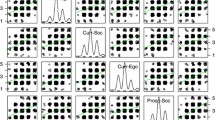Conclusion
According to our empirical results, voting patterns in the NFR were consistent with the central thesis of an expressive model, that moral expression dominates consequentialist behavior when choice is costless. While consequentialist theory would predict that owners of capital would favor nuclear weapons, capital owners could afford to vote contrary to their interests, and in line with common morality, because the costs of moral expression in the NFR were so low. Just as the capital ownership variables do not work in the direction predicted by our consequentialist model, neither does income. Does this mean that wealthy voters cast votes diametrically opposed to their self-interest? Not at all. The expressive model contends that when voting is costless, people do not have interests, but, rather, moral judgments which now cost very little to express. Indeed, when votes involve words, not even individuals' interests in government expenditure can be detected.
Similar content being viewed by others
References
Amemiya, T. (1985). Advanced econometrics. Cambridge, MA: Harvard University Press.
Aristophanes. (1973). Ecclesiazusae. Ed. R.G. Ussher. Oxford: Oxford University Press.
Aristotle. (1975). The Nicomachean ethics. Trans. H. Rackham. Loeb Classical Library. Cambridge MA: Harvard University Press.
Brennan, G., and Lomasky, L. (1985). The impartial spectator goes to Washington. Economics and Philosophy 1: 189–211.
Buchanan, J. (1984). Paradox of jogging. Public Choice Working Papers.
Buchanan, J., and Tullock, G. (1962). The calculus of consent. Ann Arbor: University of Michigan Press.
Chandler, R. (1983). Falwell sets his sights on ‘Freezeniks’. Los Angeles Times 2 (April): Section 1A, p1.
Deacon, R.T., and Shapiro, P. (1975). Private preference for collective goods revealed through voting on referenda. American Economic Review 65: 933–955.
The Defense Monitor (1982). 8: 7–10.
Freeman, K. (1971). Ancilla to the pre-socratic philosophers. Oxford: Basil Blackwell.
Jordan, B. (1975). The Athenian navy in the Classical period. University of California Publications: Classical Studies. Berkeley.
Kalven, J. (1982). A talk with Louis Harris. The Bulletin of the Atomic Scientist 38: 3–5.
Kim, T. (1987). Intransitive indifference and revealed preference. Econometrica 55: 163–167.
Ladd, E.C. (1982). The freeze framework. Public Opinion 5: 20–41.
Lehmann, E.L. (1975). Nonparametrics. Oakland: Holden-Day.
Levy, D. (1984). Towards a neo-Aristotelean theory of politics. Public Choice 42: 39–54.
Levy, D. (1988). Utility enhancing consumption constraints. Economics and Philosophy 4: 69–88.
Morgan, D., and Meier, K. (1980). Politics and morality: The effect of religion on referenda voting. Social Science Quarterly 61 (June): 144–148.
National Conference of Catholic Bishops. (1982). The challenge of peace: God's promise and our response. Origins 12 (28 October).
Pindyck, R., and Rubinfeld, D. (1981). Econometric models and economic forecasts, 2nd ed. New York: McGraw Hill.
Public Broadcasting Service. (1983). Pentagon, Inc. 21 February.
Public Opinion (1982). August/September.
Quinn, B., et al. (1980). Churches and church membership in the United States, 1980. Atlanta, GA: Glenmary Research Center.
Rubinfeld, D., and Thomas, R. (1980). On the economics of voter turnout in local school elections. Public Choice 35: 315–331.
Smith, A. (1759). Theory of moral sentiments. London.
Stigler, G.J., and Becker, G.S. (1977). De gustibus non est disputandum. American Economic Review 67: 76–90.
Thompson, E. (1974). Taxation and national defense. Journal of Political Economy 82: 755–782.
Aullock, G. (1971). Charity of the uncharitable. Western Economic Journal 9: 379–392.
Data sources
California Secretary of State. (1983). Statement of the vote: November, 1982. Sacramento.
Community Services Administration. (1981). Geographic distribution of federal funds in California, fiscal year 1980. Washington, DC: Government Printing Office.
U.S. Bureau of the Census. (1982). 1980 census of population and housing. Washington, DC: Government Printing Office.
Author information
Authors and Affiliations
Additional information
Robert Tollison and Gordon Tullock contributed to the interpretation of our results. Any errors in the paper remain our responsibility alone.
Rights and permissions
About this article
Cite this article
Feigenbaum, S., Karoly, L. & Levy, D. When votes are words not deeds: Some evidence from the Nuclear Freeze Referendum. Public Choice 58, 201–216 (1988). https://doi.org/10.1007/BF00155667
Issue Date:
DOI: https://doi.org/10.1007/BF00155667




